Why the change
Rethinking and adjusting our educational proposal has always been the tradition of the School and the Society of Jesus. In this context, in the last 10 years we have taken very important steps, in the form of innovation experiences that, based on their evaluation, encourage us to find new opportunities to improve it through a comprehensive innovation proposal, which impacts all dimensions and all the experiences that students have.
The focus of change is our students, their new realities, needs and dreams. We want to develop an educational proposal centered on experience and reflection, pillars of Ignatian pedagogy. We want to enhance what is already happening, devoting more time and energy to the central objectives defined in the mission and vision. This process invites us to rethink actions, to focus and prioritize, to achieve profound impacts, this is the meaning of change, which is reaffirmed in the pillars, but which also seeks in them the opportunities to give more robustness to the foundation on which we build the proposal.
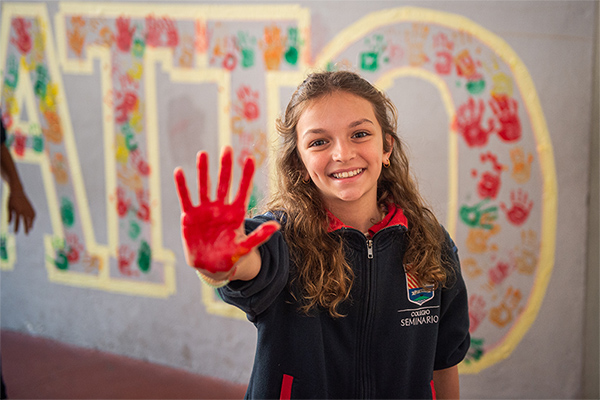
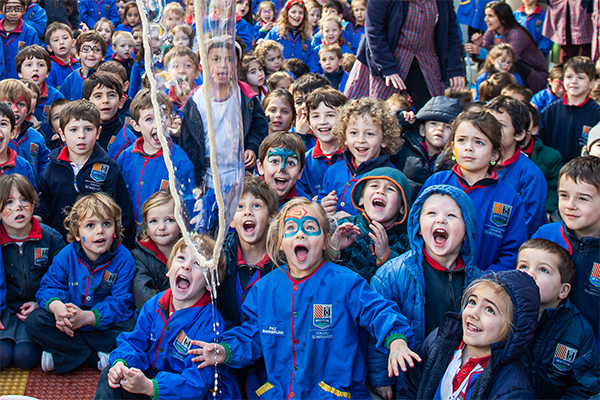
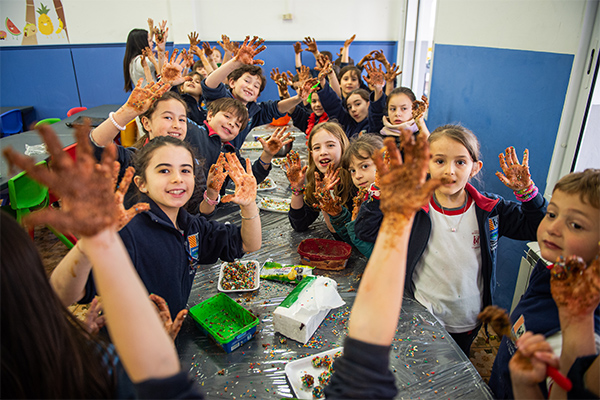
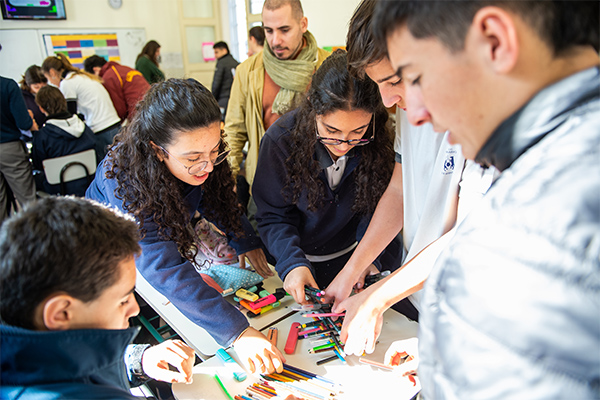
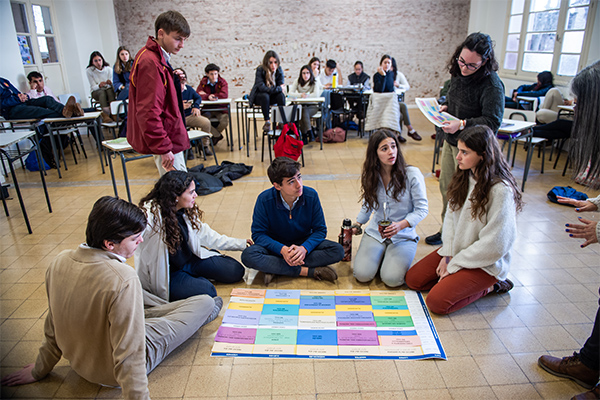
Innovation
Our school is undergoing a profound collective process of transformation. In a world where change is constant and changes so quickly, as an educational community we are called to respond creatively to the challenges of our world and of the new generations.
Framed within the tradition of innovation – a living tradition – which is the hallmark of Jesuit institutions, Ratio2030 seeks renewal and innovation in our School and its pedagogical models, and invites us to use Ignatian imagination to propose and implement better educational practices, putting the student at the center and preparing him or her for this new world.
In this process, we identified a need to prepare students to solve problems, be creative, entrepreneurial, connected with others and their environment, supportive, responsible for themselves and others, communicative, collaborative, compassionate and critical. A student who learns by doing, privileging self-knowledge and maintaining mental and spiritual balance in situations with which they are not familiar.
The Modelo de Persona, or graduate profile, is the set of traits that we propose our students develop. They are the guiding light of our educational proposal because they help us in our mission of educating mature, simple, competent and honest people, who know how to love faithfully, who can develop their life and with it their profession, as a response to God's call to serve others.
Our Modelo de Persona is made up of seven traits with various characteristics and their associated indicators that will help us in the evaluation of the entire Ratio 2030 project.
Modelo de Persona
With a life project
Who feels called
Hopeful
Integrated
Contemplative in action
With spiritual intelligence
That discerns
With emotional intelligence
Creative and critical
With imaginative, divergent and complex thinking
With critical thinking
Proactive
Analytical and argumentative
Competent learner
Metacognitive
Resilient
Curious
Autonomous
Competent and responsible communicator
Effective interlocutor
Truthful
Multilingual
Collaborative
Available
Work as a team
Dialoguer
Local, global and environmental citizen
Aware of environmental and cultural diversity
Plural
Committed
Respectful and committed to human rights
The Modelo de Persona, or graduate profile, is the set of traits that we propose our students develop. They are the guiding light of our educational proposal because they help us in our mission of educating mature, simple, competent and honest people, who know how to love faithfully, who can develop their life and with it their profession, as a response to God's call to serve others.
Our Modelo de Persona is made up of seven traits with various characteristics and their associated indicators that will help us in the evaluation of the entire Ratio 2030 project.
Modelo de Persona
With a life project
Who feels called
Hopeful
Integrated
With a life project
Who feels called
Hopeful
Integrated
Contemplative in action
With spiritual intelligence
That discerns
With emotional intelligence
Contemplative in action
With spiritual intelligence
That discerns
With emotional intelligence
Creative and critical
With imaginative, divergent and complex thinking
With critical thinking
Proactive
Analytical and argumentative
Creative and critical
With imaginative, divergent and complex thinking
With critical thinking
Proactive
Analytics
Competent learner
Metacognitive
Resilient
Curious
Autonomous
Competent learner
Metacognitive
Resilient
Curious
Autonomous
Competent and responsible communicator
Effective interlocutor
Truthful
Multilingual
Competent and responsible communicator
Effective interlocutor
Truthful
Multilingual
Collaborative
Available
Work as a team
Dialoguer
Collaborative
Available
Work as a team
Dialoguer
Local, global and environmental citizen
Aware of environmental and cultural diversity
Plural
Committed
Respectful and committed to human rights
Local, global and environmental citizen
Aware of environmental and cultural diversity
Plural
Committed
Respectful and committed to human rights
Lebs
What are LEBs (Basic Educational Guidelines)?
These are general strategies that refer to the process we follow to teach and learn. They constitute a first level of specification of our educational model, and affect all areas and sectors of our institution.
A summary of the document is presented below.
Students at the centre of the proposal
They enjoy their learning, participate actively and get deeply involved in the proposals. They work individually and collaboratively. They make decisions regarding their own learning process. They build a life project committed to serving others.
Teachers who inspire and accompany as a team
They inspire, motivate, know and accompany each student in their learning process and towards the construction of their life project. Professionals in permanent training, who reflect on their practice. They work collaboratively, in a creative, flexible and proactive way.
A reorganized curriculum
Personalized, open and flexible, based on competencies, aimed at promoting a variety of meaningful learning experiences for the comprehensive development of students. Organized around current topics, with an approach that transcends disciplines, to develop creative and humanistic responses.
An assessment for learning
A personalized and continuous process of gathering information through different instruments, to promote decision-making in the search for continuous improvement of the student learning process, the teacher's support task, and the educational proposal.
An organization of time and space at the service of learning
Organized based on the physical, cognitive, neuro-psycho-emotional and spiritual characteristics of all students at each stage of their lives and according to their specific needs. Flexible and conducive to the implementation of active pedagogies.
An educational community that supports and grows together
Interpersonal relationships are developed in a safe environment, based on respect, empathy, a supportive, collaborative and complementary attitude, which seeks the care and development of each of its members.
Engaged and invited families
Families committed to our mission and who share our value proposition, with space for active participation, with support in the educational community and invited to share their expectations, concerns and knowledge.
Implementation plan
We began to dream of the School of 2030, that of our 150th anniversary.
First activities of the Steering Team. Development of the Theory for Change, Modelo de Persona and LEBs.
Design of the first advanced change experiences (5th to 9th EBI).
Formation of teaching teams and planning of the first scenarios.
Implementation of change in 5th, 7th and 8th EBI.
Implementation of change in Preschool, 1st, 6th and 9th EB.
Implementation of change in 2nd EBI and 1st EMS.
Implementation of change in 3rd EBI and 2nd EMS.
Implementation of change in 4th EBI and 3rd EMS.
150th Anniversary of the College, surely dreaming of the future.
How to work, methodologies and interdisciplinarity
At Ratio2030 we call each of the spaces designed for learning “learning scenarios”, that is, we no longer use the old concept of a subject.
The weekly experience that students have can be classified into different learning scenarios:
- Scenarios for disciplinary in-depth study. These are those in which the content of a single subject is worked on, designed to delve deeper into the specific learning of the subject. They are carried out in each parent group.
- Interdisciplinary scenarios. These are defined by the curricular integration of different official subjects and the school's own curriculum. They can occur in a parent group, but are mostly carried out with more than one group in specially designed hyperclassrooms.
- Scenarios for deepening the basic pastoral care of the School. Led by the tutor teachers of each group, these are scenarios that can be organized by the mother group or with more than one group, as occurs with Eucharists or other celebratory spaces.
- Eligible scenarios. Eligible scenarios are offered progressively and as a strategy to promote autonomy at all levels. They generally occur in workshop format with smaller groups than the main group and with students from different groups.
Regarding methodologies, we have intentionally not defined one in order to give it preponderance. Without a doubt, the valid methodologies in this context are those that we can group as “active”, that is, all those that put the activity of the students, their experience and their reflection at the centre. Learning based on projects or problems, learning and service, case studies or topics, role modelling, design thinking, are all examples of active methodologies that are used in different learning scenarios.
R-Day
It is a day in which we invite our students to dream of a transformed school. Thus, by integrating our students, we take an essential step in this innovation project that we call Ratio2030.
A day in which, from the youngest to the oldest, they think, write, sing, dance, paint, create and express themselves, encouraged by their classmates and by all the employees of the School.
Joy, training, fun, surprise, laughter, reflection, encounter and excitement were some of the feelings that accompanied these days.


